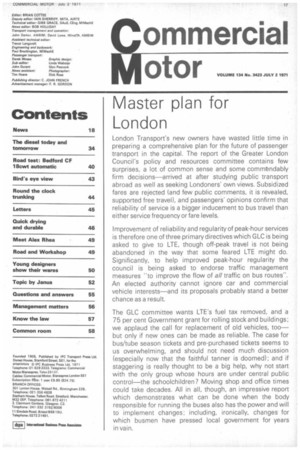Master plan for London
Page 19

If you've noticed an error in this article please click here to report it so we can fix it.
London Transport's new owners have wasted little time in preparing a comprehensive plan for the future of passenger transport in the capital. The report of the Greater London Council's policy and resources committee contains few surprises, a lot of common sense and some commendably firm decisions—arrived at after studying public transport abroad as well as seeking Londoners' own views. Subsidized fares are rejected (and few public comments, it is revealed, supported free travel), and passengers opinions confirm that reliability of service is a bigger inducement to bus travel than either service frequency or fare levels.
Improvement of reliability and regularity of peak-hour services is therefore one of three primary directives which GLC is being asked to give to LTE, though off-peak travel is not being abandoned in the way that some feared LTE might do. Significantly, to help improved peak-hour regularity the council is being asked to endorse traffic management measures "to improve the flow of all traffic on bus routes-. An elected authority cannot ignore car and commercial vehicle interests—and its proposals probably stand a better chance as a result.
The GLC committee wants LTE's fuel tax removed, and a 75 per cent Government grant for rolling stock and buildings; we applaud the call for replacement of old vehicles, too— but only if new ones can be made as reliable. The case for bus/tube season tickets and pre-purchased tickets seems to us overwhelming, and should not need much discussion (especially now that the faithful tanner is doomed): and if staggering is really thought to be a big help, why not start with the only group whose hours are under central public control—the schoolchildren ? Moving shop and office times could take decades. All in all, though, an impressive report which demonstrates what can be done when the body responsible for running the buses also has the power and will to implement changes: including, ironically, changes for which busmen have pressed local government for years in vain.




































































































